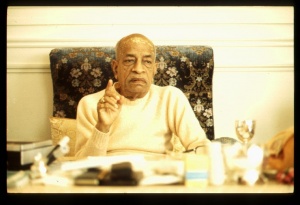SB 9.13.8: Difference between revisions
m (1 revision(s)) |
No edit summary |
||
| Line 1: | Line 1: | ||
{{info | {{info | ||
|speaker=great saints and | |speaker=great saints and brāhmaṇas | ||
|listener=demigods | |listener=demigods | ||
}} | }} | ||
[[Category:Srimad-Bhagavatam - Canto 09 Chapter 13|s08 ]] | |||
[[Category:Bhagavatam Verses Spoken by the Great Saints and Brahmanas - Vanisource|091308]] | |||
<div style="float:left">'''[[Srimad-Bhagavatam]] - [[SB 9|Ninth Canto]] - [[SB 9.13: The Dynasty of Maharaja Nimi|Chapter 13: The Dynasty of Mahārāja Nimi]]'''</div> | |||
<div style="float:right">[[File:Go-previous.png|link=SB 9.13.7]] '''[[SB 9.13.7]] - [[SB 9.13.9]]''' [[File:Go-next.png|link=SB 9.13.9]]</div> | |||
{{RandomImage}} | |||
==== TEXT 8 ==== | ==== TEXT 8 ==== | ||
<div | <div class="verse"> | ||
rājño jīvatu deho 'yaṁ | :rājño jīvatu deho 'yaṁ | ||
prasannāḥ prabhavo yadi | :prasannāḥ prabhavo yadi | ||
tathety ukte nimiḥ prāha | :tathety ukte nimiḥ prāha | ||
mā bhūn me deha-bandhanam | :mā bhūn me deha-bandhanam | ||
</div> | </div> | ||
| Line 17: | Line 22: | ||
==== SYNONYMS ==== | ==== SYNONYMS ==== | ||
<div | <div class="synonyms"> | ||
''rājñaḥ''—of the King; ''jīvatu''—may again be enlivened; ''dehaḥ ayam''—this body (now preserved); ''prasannāḥ''—very much pleased; ''prabhavaḥ''—all able to do it; ''yadi''—if; ''tathā''—let it be so; ''iti''—thus; ''ukte''—when it was replied (by the demigods); ''nimiḥ''—Mahārāja Nimi; ''prāha''—said; ''mā bhūt''—do not do it; ''me''—my; ''deha-bandhanam''—imprisonment again in a material body. | |||
</div> | </div> | ||
| Line 24: | Line 29: | ||
==== TRANSLATION ==== | ==== TRANSLATION ==== | ||
<div | <div class="translation"> | ||
"If you are satisfied with this sacrifice and if you are actually able to do so, kindly bring Mahārāja Nimi back to life in this body." The demigods said yes to this request by the sages, but Mahārāja Nimi said, "Please do not imprison me again in a material body." | "If you are satisfied with this sacrifice and if you are actually able to do so, kindly bring Mahārāja Nimi back to life in this body." The demigods said yes to this request by the sages, but Mahārāja Nimi said, "Please do not imprison me again in a material body." | ||
</div> | </div> | ||
| Line 31: | Line 36: | ||
==== PURPORT ==== | ==== PURPORT ==== | ||
<div | <div class="purport"> | ||
The demigods are in a position many times higher than that of human beings. Therefore, although the great saints and sages were also powerful brāhmaṇas, they requested the demigods to revive Mahārāja Nimi's body, which had been preserved in various perfumed balms. One should not think that the demigods are powerful only in enjoying the senses; they are also powerful in such deeds as bringing life back to a dead body. There are many similar instances in the Vedic literature. For example, according to the history of Sāvitrī and Satyavān, Satyavān died and was being taken away by Yamarāja, but on the request of his wife, Sāvitrī, Satyavān was revived in the same body. This is an important fact about the power of the demigods. | The demigods are in a position many times higher than that of human beings. Therefore, although the great saints and sages were also powerful ''brāhmaṇas'', they requested the demigods to revive Mahārāja Nimi's body, which had been preserved in various perfumed balms. One should not think that the demigods are powerful only in enjoying the senses; they are also powerful in such deeds as bringing life back to a dead body. There are many similar instances in the Vedic literature. For example, according to the history of Sāvitrī and Satyavān, Satyavān died and was being taken away by Yamarāja, but on the request of his wife, Sāvitrī, Satyavān was revived in the same body. This is an important fact about the power of the demigods. | ||
</div> | </div> | ||
__NOTOC__ | |||
<div style="float:right; clear:both;">[[File:Go-previous.png|link=SB 9.13.7]] '''[[SB 9.13.7]] - [[SB 9.13.9]]''' [[File:Go-next.png|link=SB 9.13.9]]</div> | |||
__NOTOC__ | |||
__NOEDITSECTION__ | |||
Revision as of 09:59, 16 May 2021

A.C. Bhaktivedanta Swami Prabhupada
TEXT 8
- rājño jīvatu deho 'yaṁ
- prasannāḥ prabhavo yadi
- tathety ukte nimiḥ prāha
- mā bhūn me deha-bandhanam
SYNONYMS
rājñaḥ—of the King; jīvatu—may again be enlivened; dehaḥ ayam—this body (now preserved); prasannāḥ—very much pleased; prabhavaḥ—all able to do it; yadi—if; tathā—let it be so; iti—thus; ukte—when it was replied (by the demigods); nimiḥ—Mahārāja Nimi; prāha—said; mā bhūt—do not do it; me—my; deha-bandhanam—imprisonment again in a material body.
TRANSLATION
"If you are satisfied with this sacrifice and if you are actually able to do so, kindly bring Mahārāja Nimi back to life in this body." The demigods said yes to this request by the sages, but Mahārāja Nimi said, "Please do not imprison me again in a material body."
PURPORT
The demigods are in a position many times higher than that of human beings. Therefore, although the great saints and sages were also powerful brāhmaṇas, they requested the demigods to revive Mahārāja Nimi's body, which had been preserved in various perfumed balms. One should not think that the demigods are powerful only in enjoying the senses; they are also powerful in such deeds as bringing life back to a dead body. There are many similar instances in the Vedic literature. For example, according to the history of Sāvitrī and Satyavān, Satyavān died and was being taken away by Yamarāja, but on the request of his wife, Sāvitrī, Satyavān was revived in the same body. This is an important fact about the power of the demigods.